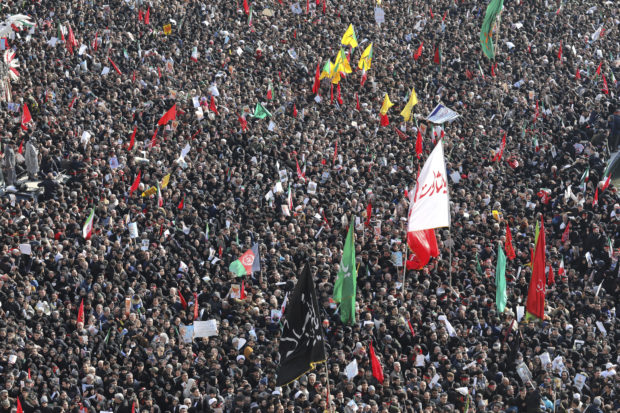China says Iran was ‘forced’ to act on nuke deal

Mourners attend a funeral ceremony for Iranian Gen. Qassem Soleimani and his comrades, who were killed in Iraq in a U.S. drone strike on Friday, at the Enqelab-e-Eslami (Islamic Revolution) square in Tehran, Iran, Monday, Jan. 6, 2020. The processions mark the first time Iran honored a single man with a multi-city ceremony. Not even Ayatollah Ruhollah Khomeini, who founded the Islamic Republic, received such a processional with his death in 1989. Soleimani on Monday will lie in state at Tehran’s famed Musalla mosque as the revolutionary leader did before him. (AP Photo/Ebrahim Noroozi)
TEHRAN, Iran — China on Monday said it believes Iran was “forced” to reduce its commitment to the 2015 nuclear deal, adding the “recent military adventures by the U.S. violated the basic norms governing international relations.”
Iran on Sunday abandoned the remaining limits of the agreement in response to the U.S. airstrike that killed its top military commander. The country mourned him Monday.
Chinese foreign ministry spokesman Geng Shuang also said that “there is no way out by military means, and extreme pressure will not work.” He further said that “power politics is unpopular and unsustainable.”
China is among the countries that signed the nuclear deal. The spokesman asserted that Iran has demonstrated restraint under the agreement and “did not violate its obligations.”
Germany’s foreign minister, meanwhile, said European powers will respond this week to Iran’s announcement that it will no longer abide by the limits contained in the 2015 nuclear deal.
Article continues after this advertisementFrance, Britain, and Germany, along with Russia and China – the two other remaining signatories – have been trying to keep the agreement alive after President Donald Trump pulled the U.S. out in 2018. Tehran in recent months broke some of the deal’s limits as part of a step-by-step pressure campaign to get sanctions relief.
Article continues after this advertisementGerman Foreign Minister Heiko Maas said Monday the Europeans will talk to Iran and the U.N. nuclear watchdog and take a coordinated decision. He noted that the agreement contains procedures to respond to such situations.
He told Deutschlandfunk radio that “this could be the first step toward the end of this agreement, which would be a great loss – and so we will weigh things up very, very responsibly.”
As for France’s finance minister, the current tensions in the Middle East could affect global economic growth and reinvigorate Islamic State group extremists.
Finance Minister Bruno Le Maire said Monday on France-Inter radio that “you must always ask who is served by and who profits from this instability. The instability in the Mideast today benefits only one organization: the Islamic State group.”
Le Maire said the instability “will increase the terrorist threat over France and Europe” adding that “all tensions always affect global economic growth.”